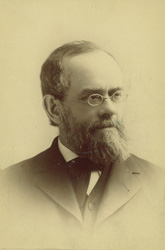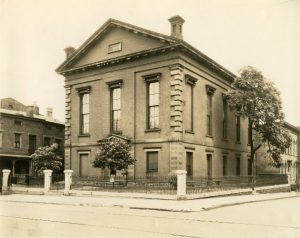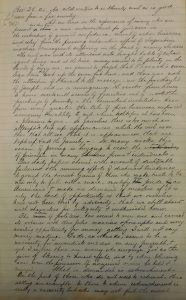
I first “met” Murray Shipley when I began researching my book Friends Past and Present: The Bicentennial History of Cincinnati Friends Meeting (1815–2015). I was immediately intrigued by his character and accomplishments. A deeply devout man, Shipley was very active in Cincinnati Friends Meeting, and was recorded as a minister in 1868. He was also a successful dry goods merchant, the founder of The Children’s Home, a trustee of Earlham College, and an advocate for peace, missionary work, temperance, and prison reform.
After I completed Friends Past and Present, I decided to undertake writing Shipley’s biography. This included reading through dozens of books, 2,000 newspaper articles, 600 pieces of family correspondence, and 400 pages of manuscripts archived at the Quaker & Special Collections library at Haverford College in Pennsylvania. It was there that I discovered a rare find—a journal containing sermons he wrote between 1873 and 1876.
Traditionally, Quaker ministers did not write down their messages in advance; they were expected to speak as led by the Spirit in the moment. Friends were also discouraged from transcribing the messages they heard. As a result, almost no Quaker sermon manuscripts from the mid-nineteenth century have survived.

Shipley preached during a particularly tumultuous time in American Quaker history. He was one of a cadre of Quaker leaders who were concerned about spiritual stagnation within the Religious Society of Friends. These reformers encouraged more vocal ministry during worship, especially by the young. Influenced by the English Quaker minister Joseph John Gurney, they also endorsed a more systematic approach to Bible study and an openness to the work of theologians from other Protestant denominations. During the 1870s, many Quaker meetings were also significantly influenced by the revival meetings of the interdenominational holiness movement. Some Friends perceived these challenges to traditional Quaker faith and practice as a breath of fresh air; others found them more like a cyclone, leaving discord and disruption in their wake.
Shipley himself used language that might feel foreign to many contemporary members of our meeting. He spoke frequently of sin, the need for salvation, the atoning blood of Christ, and obedience to God’s will, yet he also espoused many fundamental tenets of Quakerism. For example, he noted that “unless there was a living principle in the plant, the warmth of the sun would no more unfold the blossoms, than it can open an artificial bud, or a painted one.” In other words, without some flicker of Inward Light within the soul, without the living seed of Christ implanted in the heart, it would not be possible to respond to God’s loving outreach. He also believed that the transformation wrought in the soul by God would find its expression in demonstrations of love toward others.

In addition to providing insights into the Orthodox Quaker theology of his time, Shipley’s sermons can be very engaging. He used a wide variety of rhetorical techniques to communicate his message, including vivid personal anecdotes, imaginative narratives, unusual allegories, and references to current events.
Optimistic that this work would address a gap in Quaker scholarship, I spent about 18 months transcribing the 58 sermons in Shipley’s journal; identifying those that represented his best work; lightly editing them for spelling, punctuation, and clarity; organizing them into chapters; and writing a preface and introductory material. The book also includes two bibliographies (one for the works Shipley himself cited, and one for my own resources) as well as an index.
Recently, Friends United Press agreed to publish Sowing the Seed of Truth: Orthodox Quaker Sermons of Murray Shipley (1873–1876), including a foreword by Thomas Hamm, one of the world’s leading experts on American Quakers. Friends United Press is the publishing arm of Friends United Meeting, which is an international Quaker organization of which Cincinnati Friends Meeting is a constituent meeting. The printing schedule for the book has not yet been determined, so stay tuned for future announcements!
[It] is our duty to go forth and sow the seed as the Lord may direct us, but our dependence is on God who causes the seed sown “to grow up.” It is not that we impart the Holy Ghost, but that to our hand is entrusted the sowing of the seed of truth.
~ Murray Shipley, March 18, 1876

Thank you for doing this work. It is always interesting to look into our past to better understand how openness to the leadings of Spirit has made us who we are as Friends today.
I look forward you your book.
Thanks Sabrina. You have successfully whetted my appetite; I’m looking forward to reading the published version of this book. It is very interesting to know that Shipley’s sermons exist in and helped to shape the stream of worship at Cincinnati Friends Meeting that we participate in today,
From both a spiritual perspective and an historical one, this book sounds enticing.